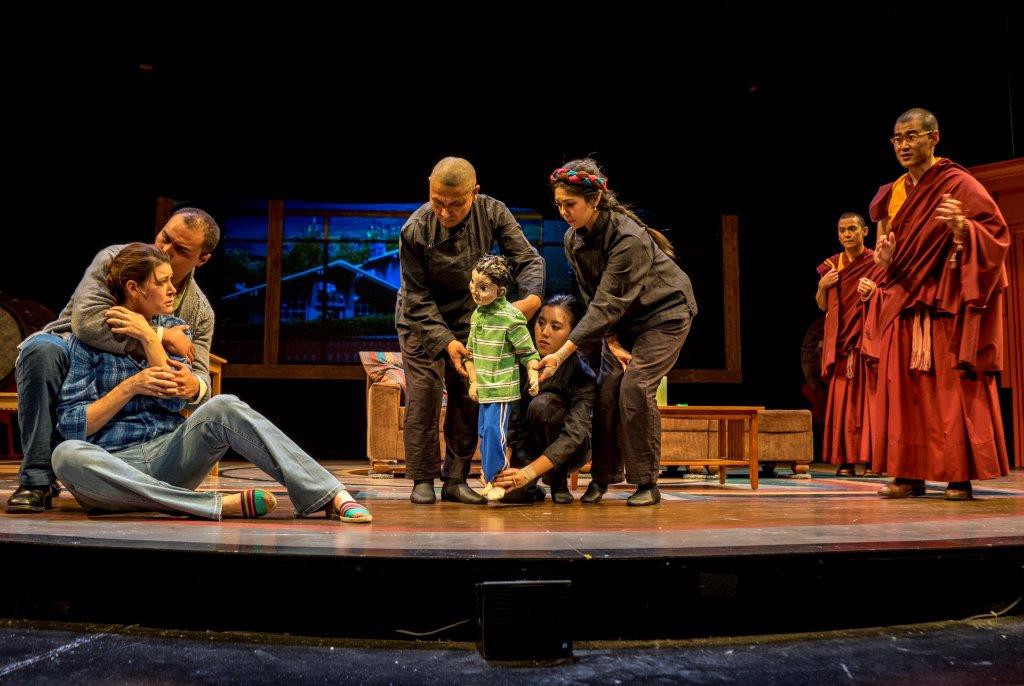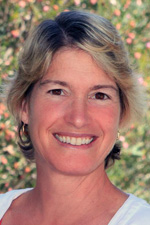
By Eva Trieger

SAN DIEGO — The San Diego REPertory Theater has the perfect recipe for success in its current show, The Oldest Boy. Little could improve upon the synergistic combination of playwright Sarah Ruhl, director Sam Woodhouse, and actor Amanda Sitton. The play recalls Bernardo Bertolucci’s 1994 film, Little Buddha, which starred Bridget Fonda, Keanu Reeves and Chris Isaak.
Unlike the film, the play is three dimensional, and the actors bring complex characters to life. A young mom (Sitton), a young father (Napoleon Tavale), must come to terms with the incomprehensible notion that their son is a reincarnation of a high Buddhist teacher. This idea is introduced through puppetry, dance, music and choreography. Through an artful exploration, two monks arrive at the family residence seeking their teacher. The splendid cast is graced by Tsering Dorjee Bawa, unique as a professional Tibetan actor in America.
The gifted cast only adds to the magic of the show, but the story really drives the viewers’ emotional response. How many mothers can release their three year old to a greater cause? It is a tug of war few moms have to face. However, in this instance, there are so many indicators that this child is, in fact, the reincarnation of an important lama.
Sitton, as always, delivers a performance that is not only credible, but her indecision and pain are ingested by the viewer. We share her agonizing choice and the ultimate knowledge that she must give up her oldest boy to his true calling.
When the play opens, young mom, Sitton, is trying to meditate during her three-year-old son’s fitful nap. The baby monitor constantly interrupts her Zen buzz, but she persists until the doorbell notifies her of two monks’ arrival. She greets them, assuming they are friends of her Tibetan husband.
When Lama (Albert Park) and Monk (Christopher Aguilar) arrive they ask a few questions of this young mom. They want to know if she is Buddhist. She replies, “Kind of…” Sitton’s character explains she hasn’t learned the language but that she is told to “talk to G-d in your first language.” So while she is on the path, she has not yet “taken refuge” in Buddhism.
Sitton tells the monks, “Every religion has its awful story.” In Judaism, it’s the Abraham story.” She relates that G-d tells Abraham to kill his son, and when he is just about to drive a knife into his only son, “G-d says, I was just kidding. He was just testing him.”
Through creative and poetic dance and puppetry we travel to India with all of the characters and we experience the transformation of three year old boy to wise lama. We also become a part of the transition experienced by the mother and father of this lama. With the birth of a second child they are able to bid adieu to the Oldest Boy and return to America to raise their new daughter.
The most striking part of this play was the curtain call. Amanda Sitton, still in character, was weeping after her monologue. She spoke of dreaming of her son and envisioning him talking with her. She had not recovered, and throughout her bows it was apparent she was grieving the loss of her Oldest Boy.
Tickets available at San Diego Rep 619.544.1000
*
Trieger is a freelance writer specializing in coverage of the arts. She may be contacted via eva.trieger@sdjewishworld.com.